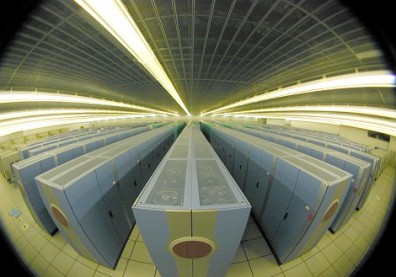Japan's projected supercomputer has a handling limit of 130 petaflops beating the present pioneer in China's Sunway Taihu Light that conveys 93 petaflops every second. By building this framework, it will launch Japan to the highest point of the world's PC rankings by year-end 2017.
Pointing a ten times increment in processing power utilizing a similar power utilization, Japan is meaning to put their next supercomputer online by 2017. , PCWorld reported. In the event that arrangements push through, the venture would cost a reported 19.5 billion yen or $173 million.
Satoshi Sekuguci, chief general at Japan's National Institute of Advanced Industrial Science and Technology (AIST), said that to the extent they know, there is nothing out there that is as quick, alluding to their arranged framework. He adds saying it leaves to the creative energy if there are mystery concealed supercomputers out there pushing through information in emptied out mountains, as indicated by Gizmondo.
Besides planning to make the quickest supercomputer, Japan likewise means to make the framework proficient. They go for power utilization less than 3 megawatts. Their more established Oakfest-PACS running at 13.6 petaflops devours a similar measure of force. China's TaihuLight devours more than 15 megawatts.
AIST plans to utilize fluid cooling for their frameworks like that utilized by the French Atos supercomputer utilized by the French Alternative Energies and Atomic Energy Commission (CEA). Atos framework arrangements to have an execution force of one exaflop, yet the framework won't be prepared to go online until 2020.
Japan’s £139m computer will be fastest in world, making 130 quadrillion calculations a second https://t.co/fbVrbLI3fm pic.twitter.com/xk8A0XxLKJ
— NationalParrot.com (@NationalParrot) November 27, 2016
AIST plans to utilize their supercomputer for profound learning applications specifically contending that of Google's DeepMind AI program. The yet unbuilt supercomputer will be called AI Bridging Cloud Infrastructure an acronym forABCI.
Japan’s ABCI computer will be 130 Petaflops but only single or half precision https://t.co/oY1eH2WISB Welcome to the world of AI FLOPS! #HPC pic.twitter.com/SXIZQffGSk — insideHPC.com (@insideHPC) November 26, 2016
As of present time, Japanese enterprises needed to depend on outsourcing-escalated handling needs to companies, for example, Microsoft and Google. AIST expects to assemble ABCI at the University of Tokyo's Kashiwa Campus. Offering for the venture has as of now started and will end on Dec. 8, with work anticipated that would begin mid-2017.








